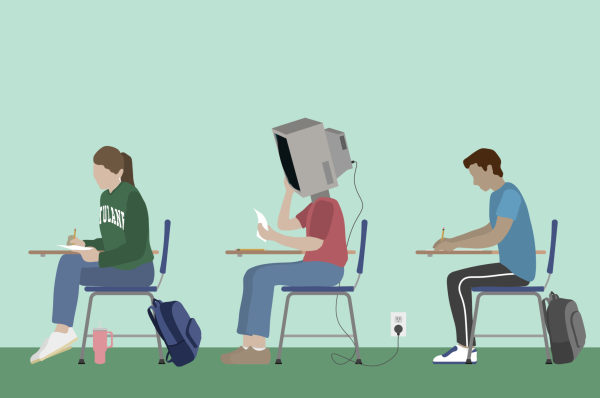
Last year, senior Jacob Friedman submitted a discussion post that was flagged for plagiarism. A professor accused him of using artificial intelligence, he said.
But Friedman insisted he never used ChatGPT.
The sudden rise of artificial intelligence chatbots last year forced colleges and universities into complex new debates about the originality of students’ work. Tulane University’s Code of Academic Conduct defines plagiarism as the “unacknowledged or falsely acknowledged presentation of another person’s ideas, expressions, or original research as one’s own work, in rough or working drafts as well as in final drafts.”
But students across the country have begun to challenge accusations that they plagiarized using AI. A student at Midwestern State University in Texas claimed she was wrongly accused of academic dishonesty this summer. At Texas A&M University-Commerce, a professor accused a whole class of using ChatGPT. And a student at UC Davis fought back after a professor accused him of writing an essay using AI.
Many schools across the country are contemplating the threshold at which AI use becomes unethical. Last year, there was a 32% increase in reports of academic misconduct, according to Tulane’s 2022-23 Academic Integrity Report. Not every case involves AI, but policing cheating and plagiarism with no definitive tools to detect AI use is an ongoing dilemma — and Tulane is still working to solve all of these issues.
The Newcomb-Tulane College Honor Board, a group of faculty and students who police academic misconduct, undergoes monthly training on how to analyze reports of cheating, Rachel Champagne, director of academic integrity at Tulane, said. The NTC Office of Academic Integrity has not seen dramatic increases in cheating with generative AI, she said.
Champagne said while no software can definitively prove whether a student has plagiarized with AI, the school uses systems that check a student’s work with thousands of things published online — even behind paywalls.
Some faculty have embraced AI systems and sought to use them responsibly in the classroom. “But, when students use any resources available to cut corners, take short-cuts, and otherwise complete academic assignments in a method that is not a result of their own intellectual effort – they compromise their academic integrity,” Champagne said.
Plagiarism accusations
Friedman spent his finals week last semester going through the honor board process after being accused of plagiarism on an assignment for his health psychology class, he said.
Friedman said he did not try hard on the assignment. “I guess it was bad enough that the professor thought there was no way that a student could’ve written it,” he said. “She just flagged it as AI and sent it to the conduct board without talking to me.”
If a student is accused of academic misconduct, the Tulane academic integrity protocol is to inform the student of their accused violations and set up a meeting to discuss a plan of action.
Friedman said he got a few emails that notified him the assignment was flagged. “I didn’t know what that was about because it was a tiny discussion post, a completion grade,” he said. “They did three different AI detectors on it and each one came back with a different percentage of AI use, when I wrote it all myself.”
“I had to explain that it wasn’t the best writing, but it was my writing,” he said. “It was during finals, it was pretty stressful.”
When Friedman put his work through his own detectors, he said each found different levels of plagiarism. Friedman said that the detectors concluded percentages of “around 99%, the other 1%, and another 45%.”
“It was all over the place,” he said.
New era
In a letter to the Tulane faculty addressing GenAI, Provost Robin Forman, said “each instructor has the option of putting in place any guidelines that make the most sense for their specific course or project, but your instructions must be clear and precise.”
English professor Rivera Montes runs her essay prompts through ChatGPT to make comparisons between AI responses and student responses before handing the prompts to students.
“I trust my gut and use my intuition,” Montes said. “I know what is a student voice and what is a machine.”
Montes uses an anti-plagiarism tool if she suspects AI use. She ensures she has a formal conversation with the student and that she does not accuse a student without concrete, exact evidence that their work is copied, she said.
She has adjusted the difficulty of her essay prompts to make it more challenging for ChatGPT to generate a sufficient response.
“I am proactive and inventive with what assignments I give students, so students also require thinking on their parts,” Montes said. “Good work continues to need critical thinking, and AI can not give you that.”


